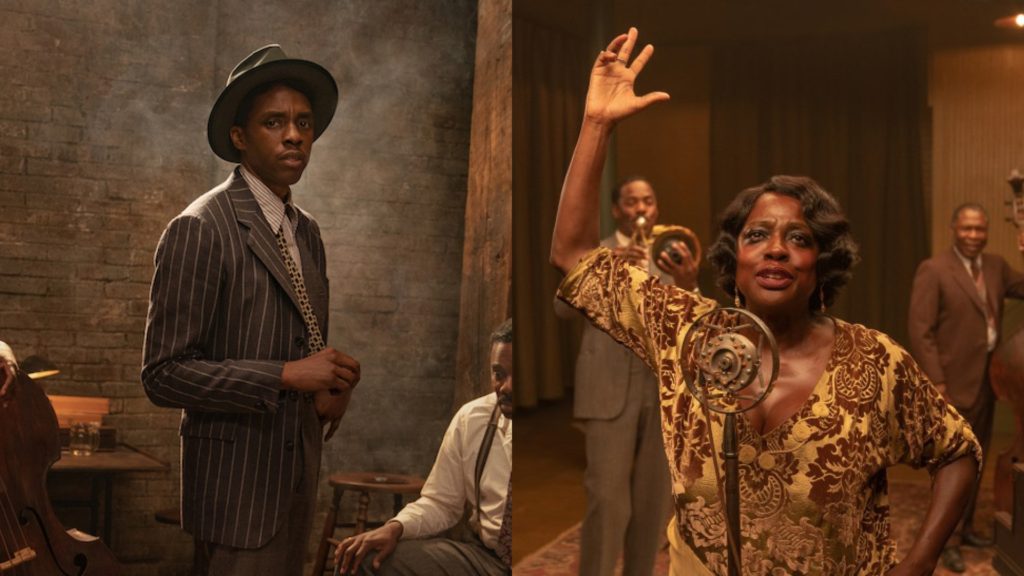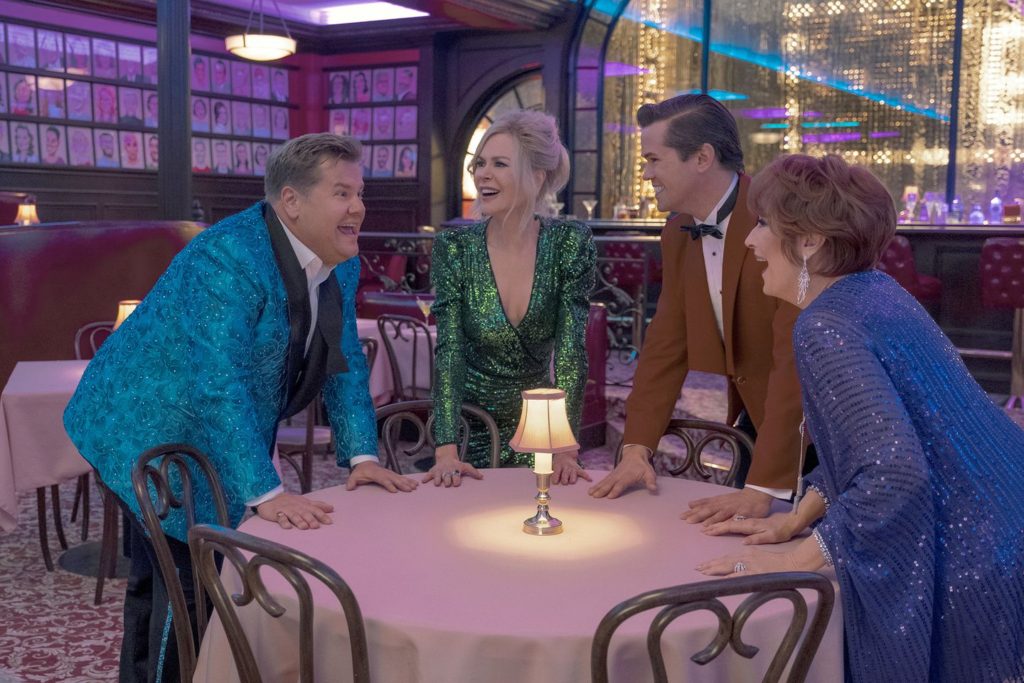VIEWPOINTS – Highly anticipated stage-to-screen adaptations: A searingly acted MA RAINEY’S BLACK BOTTOM and a faithfully transcribed THE PROM
- By drediman
- December 27, 2020
- No Comments
December was a big month for major stage-to-screen adaptations. Indeed, much to the delight of locked-down theater fans, the recent weeks saw the Netflix premieres of the highly anticipated film adaptations of Ma Rainey’s Black Bottom and The Prom. Here are my thoughts on the them.

MA RAINEY’S BLACK BOTTOM
Netflix
There’s been much hype around the two central performances in the film adaptation of August Wilson’s Ma Rainey’s Black Bottom (HIGHLY RECOMMENDED), which is headlined by the great Viola Davis as the legendary titular blues singer and the late Chadwick Boseman as a talented but tempestuous trumpeter in Ma’s band. So let me get it out of the way – neither disappoint, both turning in searing performances you don’t want to miss. Ms. Davis’s towering portrayal is both earthy and regal, while Mr. Boseman’s restless, railing performance nearly combusts the film with its Shakespearian heft. I have a hunch that both turns will be widely remembered and handsomely rewarded come awards season.
Set in 1927 Chicago in a claustrophobic recording studio, the piece depicts a recording session during which tensions rise between Ma and her white agent and record producer, as well as between members of her band. The biggest difference from the stage play is that the film runs a sleek 90-minutes (the heavily edited screenplay is credited to Ruben Santiago-Hudson). Whereas Wilson’s underlying play is a sprawling, loosely-structured mosaic whose pieces take their time to coalesce, Mr. Santiago’s streamlined adaptation goes for the jugular pretty aggressively, thankfully with minimal impact to Wilson’s dynamic dialogue and the work’s tragic dimensions.
George C. Wolfe follows suite with direction that’s stylish, sensual, and focused, which allows Wilson’s central themes (e.g., cultural appropriation, compromises made by the Black artist, institutional racism) to surface with pronounced force. There’s also a jazzy syncopation to Mr. Wolfe’s work that nicely complements Wilson’s often operatic linguistic riffs (kudos also to the superlative performances of the supporting cast, which includes Glynn Turman, Colman Domingo, and Michael Potts, who make Wilson’s words positively sing). But perhaps his most striking directorial contribution are the film’s wordless bookend scenes, which potently provide context to Ma Rainey and her hardened, uncompromising worldview.

THE PROM
Netflix
Operating very far away from the claustrophobic tragedy of Ma Rainey’s Black Bottom is the ubiquitous Ryan Murphy’s film adaptation of the bubbly cult musical The Prom (RECOMMENDED) for Netflix. When I first saw the show – about the high spirited efforts of a group of Broadway veterans to ensure that a midwestern lesbian high schooler gets to attend her prom – on the Great White Way two years ago, I fell hard for its inclusive messaging and giddy highs (e.g., Casey Nicholaw’s high-energy choreography). And despite its progressive agenda,The Prom proved itself to be at heart a big old Broadway musical in the most traditional sense, which I then found to be part of its charm.
However, seeing the work again a few years later has exposed some of the creakier elements in Matthew Sklar and Chad Beguelin’s score and Bob Martin’s book. The broad stereotypes that popped onstage now, in close-up, potentially draw unwanted attention to their arch two-dimensionality. Additionally, the musical’s incessant reliance on derivative self-parody can sometimes seem like a dated and wearying way to up the entertainment value. Although it was fun to revisit the many undeniable pleasures of The Prom, I wish Mr. Murphy had taken the opportunity to reconsider the musical on a more wholesale level rather than faithfully transcribing (more or less) a relatively close facsimile of the traditionally-structured stage show onto the screen.
Luckily, the aspects of the show that I adored most onstage have remained intact in the film transfer, primarily the exuberant performances (note, however, that the film has been totally recast from its Broadway incarnation). And what a deluxe cast Mr. Murphy has assembled for his movie! Meryl Streep, James Corden, Nicole Kidman, Keegan-Michael Key, Andrew Rannells, Ariana DeBose, Kerry Washington, and Jo Ellen Pellman provide an almost embarrassing amount of Hollywood star power to a show that was ironically driven by relative unknowns on Broadway. Although there’s been much controversy over having Mr. Corden (who is straight) play a flamboyant gay man, he – along with his fellow A-list cast mates – play their roles with heart and infectious abandon, true to the spirit of The Prom.

 Copyright © 2024
Copyright © 2024
Leave a Reply